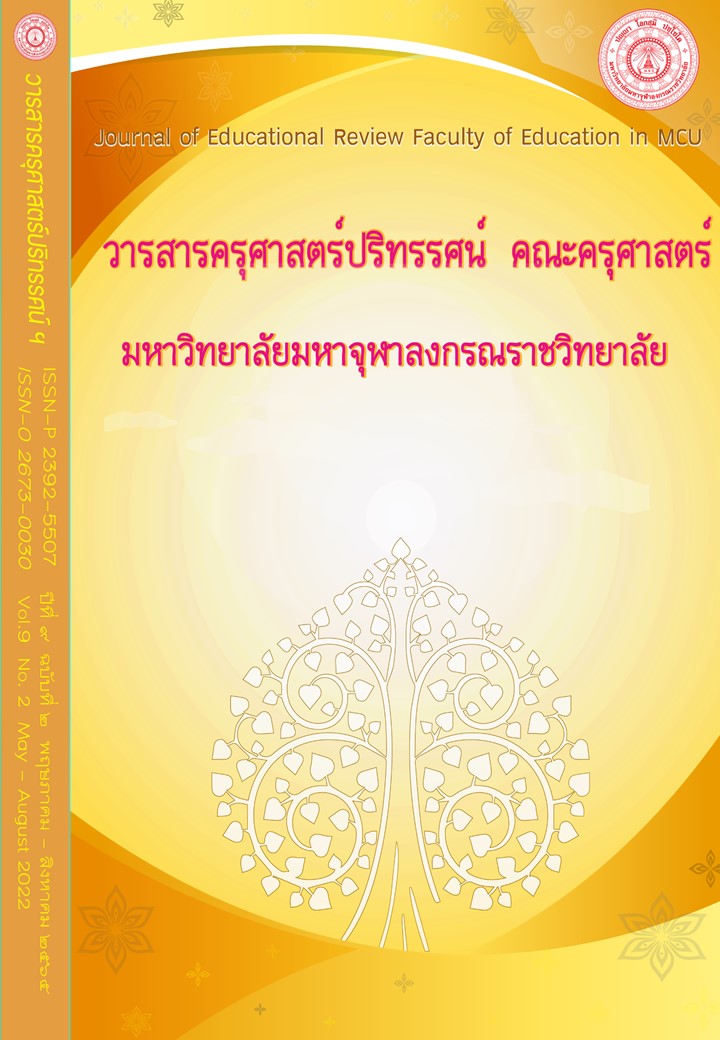GUIDELINES FOR DEVELOPMENT OF DESIRABLE CHARACTERISTICS OF TEACHER-MONKS IN THAI SOCIETY
Main Article Content
Abstract
The objectives of this research were: 1) to study the desirable characteristics of teacher-monks in Thai society, 2) to study the correlation of factors affecting the development of desirable characteristics of teacher-monks in Thai society, and 3) to propose the factors affecting the development guideline of desirable characteristics of teacher-monks in Thai society. The qualitative and quantitative data were collected for this descriptive research. The quantitative research method was used to extend the results of qualitative research. The data were collected from 310 samples and research tools were interview form and questionnaires. Data were analyzed by descriptive statistics, Pearson’s correlation and confirmatory factor analysis. The results of the study showed that: 1) the desirable characteristics of teacher-monks in Thai society consisted of 4 significant factors; discipline, virtue, good personality, good teaching and self-improvement. 2) The correlation of 13 observable variables indicated that there were 78 pairs of variables with statistically significant value at 0 (p < .01) and with range, correlation coefficient at -0.026 to 0.905. In considering the correlation of observable variables, it was found that the majority of variables had correlation with statistical significance and in a positive correlation, and 3) the results of model validity assessment of factors affecting the development guideline of desirable characteristics of teacher-monks in Thai society with the Bhavana IV as a mediator found that the model was fit with empirical data (x2 = 72.47, df = 56, p = .068, GFI = .965, AGFI = .943, RMSEA = .031). When considering the mediator, it was found that Bhavana IV had a higher indirect effect than the direct effect. This means that the developed causal relationship model has Bhavana IV as a good mediator.
Article Details

This work is licensed under a Creative Commons Attribution-NonCommercial-NoDerivatives 4.0 International License.
ทัศนะและความคิดเห็นที่ปรากฏในบทความในวารสารฉบับนี้ถือเป็นความรับผิดชอบของผู้เขียนบทความนั้นเพียงผู้เดียว และไม่ถือเป็นทัศนะและความรับผิดชอบของกองบรรณาธิการ
กองบรรณาธิการขอสงวนสิทธิ์ในการคัดเลือกบทความลงตีพิมพ์และจะแจ้งให้เจ้าของบทความทราบหลังจากผู้ประเมินบทความตรวจอ่านบทความแล้ว
ต้นฉบับที่ได้รับการตีพิมพ์ในวารสารครุศาสตร์ปริทรรศน์ คณะครุศาสตร์ มหาวิทยาลัยมหาจุฬาลงกรณราชวิทยาลัย ถือเป็นกรรมสิทธิ์ของคณะครุศาสตร์ มหาวิทยาลัยมหาจุฬาลงกรณราชวิทยาลัย ห้ามนำข้อความทั้งหมดหรือบางส่วนไปพิมพ์ซ้ำ เว้นเสียแต่ว่าจะได้รับอนุญาตจากมหาวิทยาลัยฯ เป็นลายลักษณ์อักษร
References
จันทิมา สินธพนธนบุตร. (2548). คุณลักษณะที่พึงประสงค์ของครูอาจารย์โรงเรียนฝึกอาชีพในทรรศนะของศิษย์เก่า. วิทยานิพนธ์ศึกษาศาสตรมหาบัณฑิต. มหาวิทยาลัยราชภัฏสวนดุสิต.
พระปลัดปรีชา นนฺทโก. (2560). การศึกษาแนวทางการพัฒนาศักยภาพพระสอนศีลธรรมในโรงเรียนมัธยมศึกษาสังกัดสำนักงานคณะกรรมการการศึกษาขั้นพื้นฐานในจังหวัดระยอง. ดุษฎีนิพนธ์พุทธศาสตรดุษฎีบัณฑิต. มหาวิทยาลัยมหาจุฬาลงกรณราชวิทยาลัย.
ลำพอง กลมกูล. (2554). อิทธิพลของกระบวนการสะท้อนติดต่อประสิทธิผลการวิจัยปฏิบัติการในชั้นเรียน: การวิจัยแบบผสมวิธี. วิทยานิพนธ์ครุศาสตรดุษฎีบัณฑิต. จุฬาลงกรณ์มหาวิทยาลัย.
สุทัศน์ จอกสถิต. (2547). การวิเคราะห์องค์ประกอบคุณลักษณะความเป็นครูของครูกลุ่มเขตศรีนครินทร์ สังกัดกรุงเทพมหานคร. วิทยานิพนธ์ศึกษาศาตรมหาบัณฑิต. มหาวิทยาลัยรามคำแหง.
สำนักงานพระสอนศีลธรรม. (2550). คู่มือพระสอนศีลธรรม ประจำปีงบประมาณ 2560. นนทบุรี: เชนปริ้นติ้ง.
สำนักงานพระสอนศีลธรรม..(2558). แผนยุทธศาสตร์พระสอนศีลธรรม ในช่วงแผนพัฒนามหาวิทยาลัย ระยะที่ 11 (พ.ศ.2555-2559). กรุงเทพมหานคร: เชนปริ้นติ้ง.
สำนักงานพระสอนศีลธรรม. (2559). แผนแม่บทสำนักงานพระสอนศีลธรรม มหาวิทยาลัยมหาจุฬาลงกรณราชวิทยาลัย ระยะ 5 ปี (พ.ศ. 2560-2564). กรุงเทพมหานคร: เชนปริ้นติ้ง.


